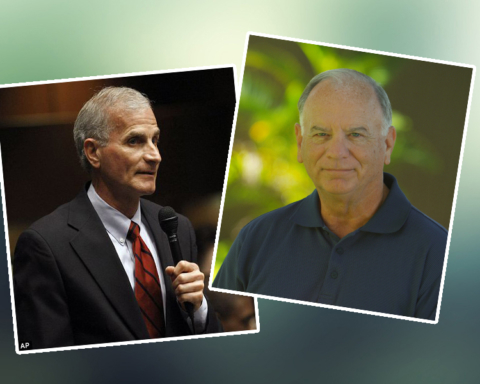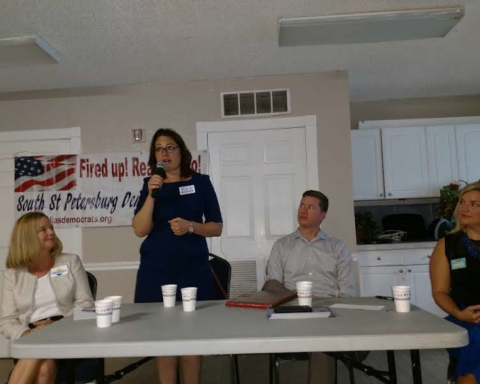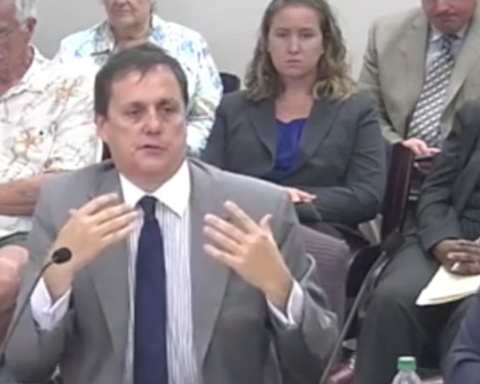 Pinellas County Commissioner Janet Long was not happy.
Pinellas County Commissioner Janet Long was not happy.
Last Monday, the board of the Hillsborough County Area Regional Transit Authority (HART) inserted revised language into a proposed Memorandum of Understanding (MOU) with PSTA to ensure that the agreement did not mean that the two transit agencies would be merging or preparing for a sales tax referendum pending because of it.
That rankled some board members, who said that the agreement is simply to officially collaborate on more issues going forward.
Upon reading about that earlier this week, Long said she became upset. Long has led the way for HART and PSTA to come together to an agreement, and she doesn’t like the insinuation feared by some critics.
“I really paid attention when Greenlight failed,” she says, referring to the 2014 Greenlight Pinellas transit tax that went down to defeat. “It frustrates me beyond belief when the Tom Rask‘s and Barb Haselden’s of the world — no matter how hard you try to be thoughtful, be considerate, be creative in terms of trying to provide good public transportation — they will not see anything good in what you do,” she said.
Rask and Haselden are two leading Tampa Bay Tea Party activists who lobbied strongly against the Greenlight plan.
“Not once have any of us have talked about a tax increase, not once have any of us talked about consolidation,” Long continued. “What we have talked about is, how can we be more effective, how can we be more efficient, and how can we work really work hard to put best practices in place to give our citizens a bigger bang for the buck. That’s what we’re focused on, and isn’t that what the Tea Party/No Tax for Tracks want?”
Rask says that Long’s claim to never having talked about a tax increase is not accurate. Both he and Haselden referred to a graphic shown at a PSTA board workshop last month with an arrow pointing toward the city of Phoenix which read in part, “regional sales tax funding PLUS Individual Jurisdiction Funding.”
“State Sen. Jack Latvala is behind this push for consolidation, and Janet Long is carrying the water for him,” Rask wrote in an email. “My guess is that she is doing it mainly as thanks to Jack Latvala for insuring that the Pinellas County Republican Party didn’t field a candidate against Janet last year. Long and Latvala are two sides of the same corrupt coin, and the voters are aware of the situation.”
For her part, Haselden refers to how the Pinellas MPO invited political consultant Jason Jordan from the American Planning Association to speak at the Tampa Bay Transportation Management Area Leadership Group last April.
Jordan reportedly spoke about the necessity for local governments to continue to push for a transit referendum.
“I don’t know whether she thinks I can’t connect the dots,” Haselden says of Long. “Does she think that we’re just totally ignorant?”
Long says that she reached out to HART CEO Katharine Eagan back in 2015, and since then they’ve met up every six or seven weeks to talk about how to get a “bigger bang for the buck” if the agencies came together in a more formal way.
This is different, she says, then when Latvala decreed back in 2012 that the agencies should consolidate. While PSTA officials didn’t seem to have much of a problem with that, most of the HART board did. Two different studies showed that there would be cost savings if the agencies consolidated, but nothing formal ever came out of those studies — until now.
“His heavy-handed tactics didn’t go over so well, and so I said to Katherine, ‘I think we can accomplish a lot of the same things that were the ultimate goal of his thought process if we try to move this forward in a voluntary way,’ ” Long says.
Long said her goal is in sync with the official line emanating from the Tampa Bay Partnership, who are calling for regional transportation governance in the Tampa Bay region. With more than two dozen agencies in the greater Tampa Bay area working on transportation solutions, the concerns being expressed is that there is no “synergy” that ties them together.
Some say the obvious model should be TBARTA, the eight-county transportation agency created by the Legislature a decade ago. But a lack of funding from the onset has hampered any serious attempt for TBARTA to fill that role. Long is outspoken in calling the agency a paper tiger.
“I don’t know if you’ve been to a TBARTA board meeting, but I thought I was going to eat my brains out!” Long says. “It is four hours of — excuse my expression — bullsh*t. All you do is listen to one study after another study after another presentation, and on and on. They don’t do anything!”
Hillsborough County Metropolitan Transportation Organization director Beth Alden says she’s all for regionalization in local transportation but says that the urgency right before the legislative session is a bit concerning.
While Long believes that a new transportation authority featuring Hillsborough, Pinellas and Pasco counties is what’s needed now, Alden says that’s “short-sighted,” saying that the region is much larger than that. She contends that if the Tampa Bay region wants to compete with other metropolitan regions around the country, it needs to include the entire areas that are in TBARTA, which include Sarasota, Hernando, Polk, Manatee and Citrus counties.
The Minneapolis/St. Paul region includes seven counties, 3,000 square miles and 3 million people. Atlanta’s includes 20 counties, 6 million people and 6,000 square miles. Dallas Fort-Worth encompasses 16 counties and over 6 million people.
The TBARTA planning area includes eight counties, 4 million people, and 8,000 square miles. “It puts us on that same playing field with the rest of the county,” Alden says.
Long doesn’t support that theory, criticizing Alden’s attitude as coming from a planner’s point of view, not “the common sense, day to day commuter of people going back and forth to work.”
“When you look at the density data, it becomes clear that the basis for this new model has got to be Pinellas, Pasco and Hillsborough,” Long says, adding that the other Tampa Bay area counties should be given goals and objectives to meet, and when they do, “they can be part of the authority.”









